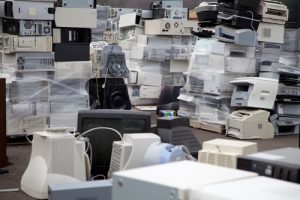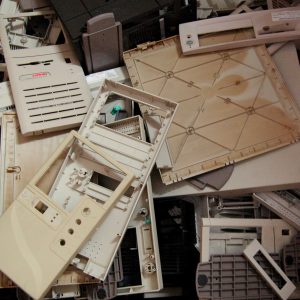 Bloomberg takes readers on a tour of the Chinese town of Guiyu as it looks to formalize electronics recycling, and flooding in parts of India has complicated e-scrap efforts.
Bloomberg takes readers on a tour of the Chinese town of Guiyu as it looks to formalize electronics recycling, and flooding in parts of India has complicated e-scrap efforts.
Continue Reading

 Bloomberg takes readers on a tour of the Chinese town of Guiyu as it looks to formalize electronics recycling, and flooding in parts of India has complicated e-scrap efforts.
Bloomberg takes readers on a tour of the Chinese town of Guiyu as it looks to formalize electronics recycling, and flooding in parts of India has complicated e-scrap efforts.
Continue Reading
 A tech startup is developing a new product to verify trustworthiness among traders of electronic scrap and other recyclable materials.
A tech startup is developing a new product to verify trustworthiness among traders of electronic scrap and other recyclable materials.
Recently unveiled robotics technology aims to boost throughputs and reduce environmental and health risks from LCD flat-panel display recycling.
 A study out of Europe highlights the environmental virtues of recycling plastics found in electronics, appliances and toys.
A study out of Europe highlights the environmental virtues of recycling plastics found in electronics, appliances and toys.
 Romania remains well short of a 2021 European Union target for e-scrap collections, and Sims Metals Management brought profitability to its global e-scrap recycling business in fiscal year 2015.
Romania remains well short of a 2021 European Union target for e-scrap collections, and Sims Metals Management brought profitability to its global e-scrap recycling business in fiscal year 2015.
 In a perverse manner, processors of obsolete electronics love stock market slumps because such phenomena can push up the value of precious metals.
In a perverse manner, processors of obsolete electronics love stock market slumps because such phenomena can push up the value of precious metals.
 India launches a project to train hundreds of thousands of people working in the unorganized e-scrap sector, and the king of Belgium helps highlight donations of refurbished computers to projects in Africa.
India launches a project to train hundreds of thousands of people working in the unorganized e-scrap sector, and the king of Belgium helps highlight donations of refurbished computers to projects in Africa.
 A state-of-the art electronics recycling facility opens in Sweden, and a retailer in Sri Lanka offers e-scrap drop-off.
A state-of-the art electronics recycling facility opens in Sweden, and a retailer in Sri Lanka offers e-scrap drop-off.
 Updated WEEE regulations begin to affect the U.K. collection system, and one market report predicts huge growth for the global e-scrap industry.
Updated WEEE regulations begin to affect the U.K. collection system, and one market report predicts huge growth for the global e-scrap industry.
 Recently unveiled robotics technology aims to boost throughputs and reduce environmental and health risks from LCD flat-panel display recycling.
Recently unveiled robotics technology aims to boost throughputs and reduce environmental and health risks from LCD flat-panel display recycling.
